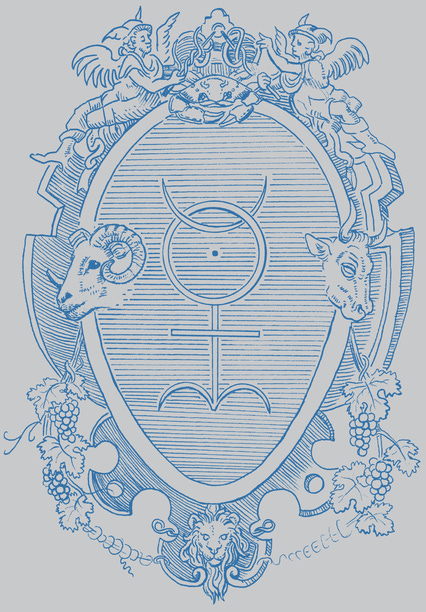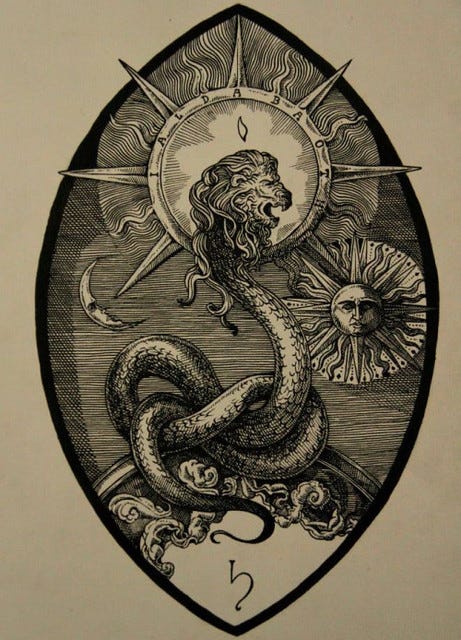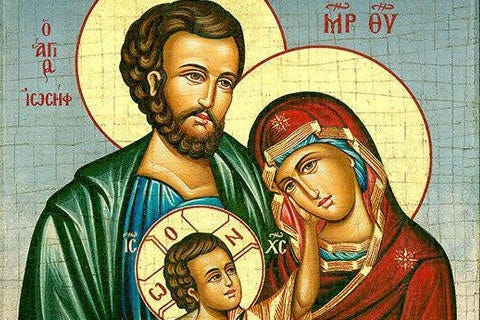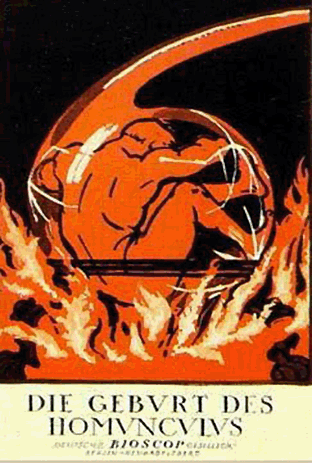This post is long. And it gets weird, so those of you who are generous enough to be paid subscribers (or comped) have access to this. The rest of you might not even be interested in the rest. Thank you for understanding. Read Part 1 here.
“Let the children come to me, and do not hinder them; for to such belongs the kingdom of heaven.” - Matthew 19:14
“Man’s ascent takes place through the overcoming of physical love, the regulation of the breathing process, and the development of kundalini light.” - Rudolf Steiner1
Only the poor in spirit can enter the kingdom of heaven. But actually abandoning power — which is always ego — is the most difficult thing in the world. One way or another, this means destroying yourself by releasing all attachments. While I might not recommend summoning the demon Choronzon to accelerate the process of disintegration, the end goal of spiritual development is to be reduced to a kind of fertile formlessness (“chaos”) — unattached yet ever ready to love, to grow anew. The spiritual life is about becoming powerless. Yet, counterintuitively, this doesn’t mean a life without striving or even without responsibilities, but I cease to be the director of my own life. As we become more powerless and less arbitrary in our willfulness, our duty becomes all the more clear. The work of a plant, attaining the fertile chaos of the new seed, is not done. It must grow again as a new plant, ever again unfolding to the light of the Sun. One burden is, after losing all power, to be slated with the enormous burden of administering power justly. As Plato suggested, those who least wish to rule make the fairest rulers.

If we become detached from the world without love, we become more dead than we were in our profligate ways.
The story of Ananias and Sapphira in the book of Acts is one of trying to cheat the Holy Spirit by trying to maintain worldly power and access the kingdom of heaven. In this instance, it is either/or: one cannot serve two masters.
“But a man named Ananias with his wife Sapphira sold a piece of property, and with his wife’s knowledge he kept back some of the proceeds, and brought only a part and laid it at the apostles’ feet. But Peter said, ‘Ananias, why has Satan filled your heart to lie to the Holy Spirit and to keep back part of the proceeds of the land? While it remained unsold, did it not remain your own? And after it was sold, was it not at your disposal? How is it that you have contrived this deed in your heart? You have not lied to men but to God.’ When Ananias heard these words, he fell down and died. And great fear came upon all who heard of it. The young men rose and wrapped him up and carried him out and buried him.”2
Not only is Ananias struck dead, but so is his wife. Those who make a false sacrifice not only abandon the outer man but also lose their own souls. Those who pursue power in the name of religion are some of the very worst people because they deny the heart of spiritual life: “My grace is sufficient for you, for my power is made perfect in weakness.”3 For those who seek to control their own lives, it is a declaration that they would rather have control and deny that what happens to them is their own karma. Lashing out against one’s fate only generates a more dire fate. We cannot escape the web of karma. This doesn’t mean we give up, no, but accept this life as our fate — to love our fate as what we need for our spiritual development and to act generously with no expectation of reward. Real metempsychotic theurgy is in storing up treasures in heaven, not becoming an embodiment of worldly power. The serpent raised up without shaving the lion’s wild mane only intensifies its godless ferocity. If detachment from the world is accomplished without a transformed heart, that is a double death. If we become detached from the world without love, we become more dead than we were in our profligate ways. Those who undergo self-mortification while maintaining selfish goals become some of the very worst people, struck dead spiritually.

The theologian Bulgakov writes, “In Plato’s Timaeus, the demiurge creates the world while contemplating ideas, that is, the Divine Sophia, out of different mixtures of being and non-being, that is, within the limits of the creaturely world, the creaturely Sophia. This demiurge is, of course, not God, but man; and this image defines the place of man in the world as a creaturely god, who creates not out of nothing, but who creates the creaturely Sophia.”3 To be clear, the “creaturely Sophia” of the demiurge is worldly wisdom. That is the best that the demiurge can do: rule this world. But we seek divine wisdom in weakness, not human cunning in our own power. “For the foolishness of God is wiser than men, and the weakness of God is stronger than men.”
As Valentin Tomberg writes, “It is a mixture of truth and illusion, mixed in an inextricable way. The true serves to prop up the false and the false seems to lend the true a new splendour.”4 The Tree of Knowledge of Good and Evil wasn’t about knowledge per se, but rather knowledge of truth mixed with falsehood. There is no fundamental difference between illicit knowledge of Abrahamic religions and the ignorance of far Eastern religions as the ground of innate evil.5 But falsehood mixed with truth is like arsenic mixed into food: what does not belong in us is poison.
Simon the Sorcerer fairs somewhat better for attempting to purchase the gift of the Holy Spirit, for his attempt to buy it was at least, by comparison, forthright:
“Now when Simon saw that the Spirit was given through the laying on of the apostles’ hands, he offered them money, saying, ‘Give me also this power, that any one on whom I lay my hands may receive the Holy Spirit.’ But Peter said to him, ‘Your silver perish with you, because you thought you could obtain the gift of God with money! You have neither part nor lot in this matter, for your heart is not right before God. Repent therefore of this wickedness of yours, and pray to the Lord that, if possible, the intent of your heart may be forgiven you. For I see that you are in the gall of bitterness and in the bond of iniquity.’ And Simon answered, ‘Pray for me to the Lord, that nothing of what you have said may come upon me.’”6
In its authentic form, it is Joseph who, in his old age as a self-contained widower, marries the consecrated Virgin Mary. Joseph symbolizes the death of egotism, the “outer man,” and a new chaste marriage to a woman he could never touch — at least, no more than any body can “touch” a soul. Plato describes the demiurge as a craftsman (τεκταινόμενος), and the gospels speak of Joseph, the earthly surrogate father of Jesus, as a carpenter (τέκτων). Joseph brought nothing with himself but trembling awe to his new custodianship of the consecrated virgin Mary. The holy family is a map for the return of the prodigal son. As Angelus Silesius says, “Were Christ born a thousand times in Bethlehem, and not in thee, thou art lost eternally.”

Paramahansa Yogananda remarks in his commentary on the Bhagavad Gita that the crisis point of spiritual life is the solar plexus chakra, the kidney center —a site that corresponds intimately with Venus and copper. Arjuna personifies the crisis of the kidneys, in which the lower energy must be crucified for the sake of divine justice. Arjuna must literally fight his own flesh and blood for the sake of the kingdom of heaven. Yogananda interprets this as the soul’s battle against its sensual attachments — not against bodily existence, but always against carnal obsessions.
The soul divorced from divine reason is a widow.
A soul divorced from reason is like Arjuna’s epic panic attack, which is the entire story of the Gita. Krishna embodies clear-sighted perception and, eventually, manages to calm Arjuna down. The soul divorced from divine reason is a widow.7 The widow is the soul whose only remaining freedom is attention, which is worth no more than two copper pennies. This is all we have to offer God:
“And he sat down opposite the treasury, and watched the multitude putting money into the treasury. Many rich people put in large sums. And a poor widow came, and put in two copper coins, which make a penny. And he called his disciples to him, and said to them, ‘Truly, I say to you, this poor widow has put in more than all those who are contributing to the treasury. For they all contributed out of their abundance; but she out of her poverty has put in everything she had, her whole living.’”8
The “widowed” soul is Eve without Adam doing his job and speaking up against the Serpent. In the Garden of Eden, Adam is there the entire time, but just doesn’t speak up. In a fallen state, the best the widowed soul can do is give back to the temple coins she had likely taken from the temple poor box! All we can give God is what we were first given by God. The Zohar parses Genesis so meticulously that it goes so far as to say Adam divorced אֶת (et) which is composed of the first and last letters of the Hebrew alphabet, a ubiquitous sign for the Shekinah. In Greek, ΑΩ symbolically means much the same thing: the unity of the first and the last is held in the feminine presencing of God, the virginal soul par excellence.9
The best the widowed soul can do in a fallen state is to give back to the temple what she took from the poor box!
The alchemist Paracelsus, though vocally sympathetic to Martin Luther’s cause, remained at least nominally Catholic his entire life. Throughout his work, Paracelsus gives recipes about invisible spiritual processes in terms of external, visible phenomena. One of his most confounding ideas is the homunculus:
Keep reading with a 7-day free trial
Subscribe to False Mirror to keep reading this post and get 7 days of free access to the full post archives.




